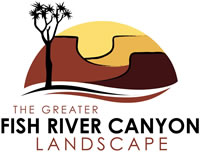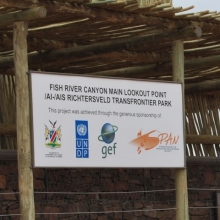Socio-economics
Land in the south of Namibia has traditionally been used for small-stock farming, originally in a nomadic system whereby pastoralists moved in response to local rainfall across large areas of land to graze sheep, goats and cattle. Over the last hundred years or so, people have become more settled around fixed water points. However, due to the low and variable rainfall, farming in this area is a very marginal activity and typically leads to land degradation and diminishing returns.
Viable land use alternatives to livestock farming in parts of this area include tourism and game farming.
Much of the area of the Greater Fish River Canyon Landscape, through the landscape members, is now used for wildlife-based non-consumptive tourism. Other areas are still used for farming, often making use of more innovative and sustainable land management practices than methods used in the past.
Relevant literature
-
Economic Returns to land-use Options in Gondwana Cañon Park, Karas, Namibia
Barnes, J.I. and Humavindu, M.N. 2003. Economic Returns to land-use Options in Gondwana Cañon Park, Karas, Namibia
This is an analysis of the economics of the primary land uses possible in the area occupied by the Gondwana Cañon Park in Karas Region, Namibia. Three land uses, traditional small-scale livestock production, large-scale commercial livestock production and nature-based tourism were analysed with financial and economic budget/cost-benefit models. Empirical data on the physical, and financial characteristics of potential land uses were assembled and analysed. Among other things, the contributions of these activities to the national income, employment, private profitability, and local community livelihoods were measured.» Download -
The ecological, social & economic implications of private game parks & private nature reserves in Namibia
The ecological, social & economic implications of private game parks & private nature reserves in Namibia
The Ministry of Environment & Tourism commissioned this study into the ecological, social, and economic implications of private game parks and nature reserves in Namibia. The Ministry engaged the services of an independent team of researchers consisting of an ecologist, an economist and a lawyer.» Download -
The socio-economic agricultural baseline survey done in the communal areas of the Karas region
Louwrens, A. 2004. The socio-economic agricultural baseline survey done in the communal areas of the Karas region. Agricola, 14: 43-51
During 2000 a very comprehensive survey was carried out in the communal areas of the Karas Region (Tses, Berseba, Bethanie and Bondelswarts). This article portrays some of the results of that survey. Results are presented on the socio-economic status of households, focusing specifically on household description and house- hold income. The article also includes information on productive resources such as water, firewood, land and live- stock, as well as on project participation of members of the community and support provided to them by government organisations and NGOs.» Download




